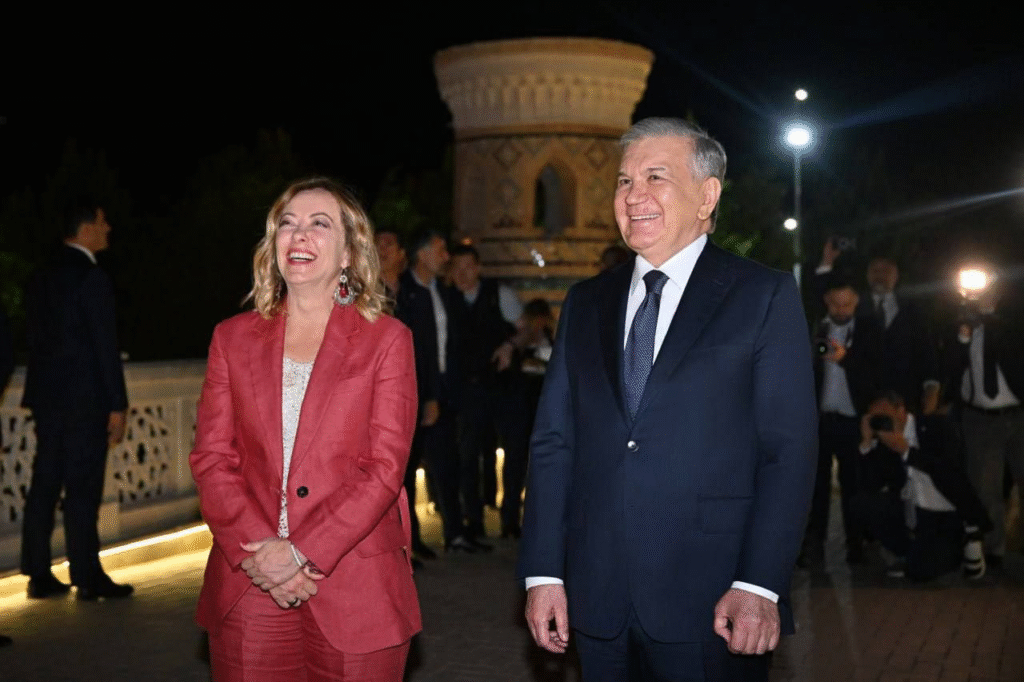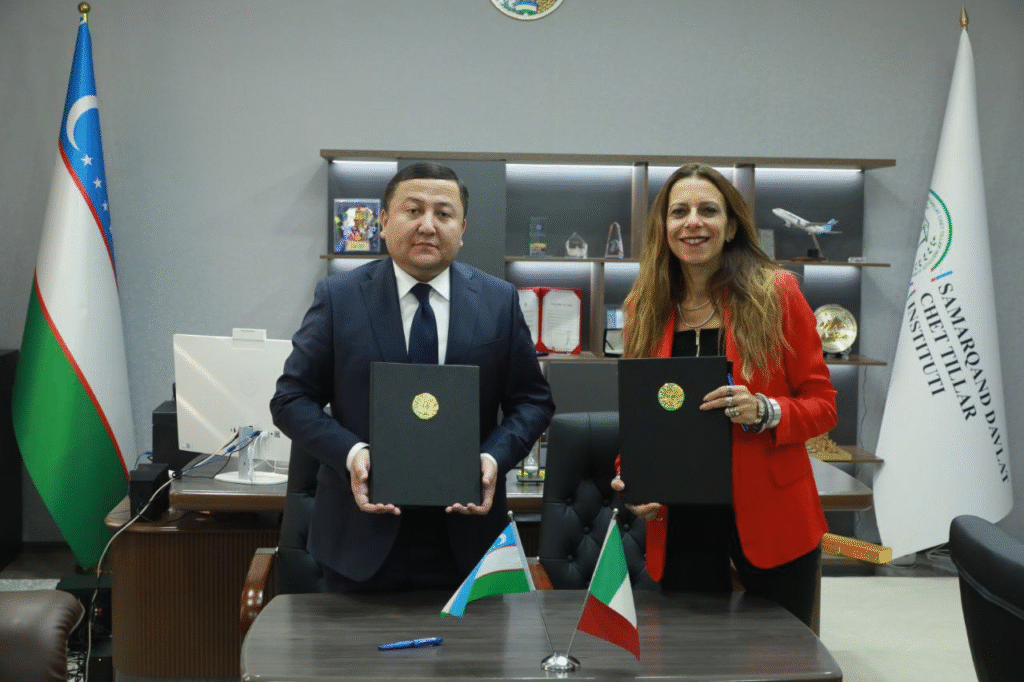Italian Prime Minister, Giorgia Meloni, arrived in Uzbekistan on May 28, 2025, for a landmark two-day state visit hosted by President Shavkat Mirziyoyev. This is the first official visit to Uzbekistan by an Italian head of government since Romano Prodi’s trip in 1997, underlining the strategic importance Rome now attaches to Central Asia.
In June 2023, President Mirziyoyev visited Italy and, together with Prime-Minister Meloni, elevated bilateral ties to a strategic partnership. The ensuing 2023 accord and a reciprocal visit by Italy’s President Mattarella last autumn have set the stage for Meloni’s Samarkand talks.
“This visit confirms the strategic value of our collaboration and the excellent level of relations between our nations,” Meloni declared on departure, a statement that reflects the new depth of Italy–Uzbekistan ties.
Symbolism & Diplomatic Significance of Samarkand
In Samarkand, Meloni was greeted by President Mirziyoyev and participated in high-level bilateral meetings and cultural engagements, including visits to Registan Square and the innovative “Eternal City” cultural complex. Registan – a UNESCO World Heritage site famous for its majestic madrasas – provided a symbolic backdrop to the visit.
As President Mirziyoyev noted in a recent interview, “Samarkand is a city that has been a centre of trade, science and diplomacy for centuries… Today, it is once again becoming a platform where Europe and Central Asia can discuss the key challenges of our time”. Choosing Samarkand underscores Uzbekistan’s emerging role as a diplomatic hub in Central Asia.
Through Samarkand and upcoming EU–Central Asia summits, Tashkent is signaling its ambition to link the region more closely with Europe. Indeed, President Mirziyoyev has emphasized that the new Central Asia–EU strategic dialogue to launch at the Samarkand summit “will open new areas in the development of interregional cooperation and interconnectivity” – a formulation that resonates with Italy’s goal of bridging Asia and Europe.

Economic and Industrial Cooperation
Italy and Uzbekistan have fostered a robust economic partnership. Bilateral trade has steadily expanded, aided by Uzbekistan’s EU preferential trade status (GSP+) and Italy’s deepening engagement with Central Asian markets. Italy pledged support for Uzbek energy projects valued at €2.2 billion through Italy’s export-credit agency, SACE.
Prominent Italian companies, including Ansaldo Energia and Danieli, are poised to enhance Uzbekistan’s industrial and energy infrastructure significantly.
Furthermore, Italy’s expertise in renewable energy and environmental sustainability is central to new collaborative projects, notably the Aral Sea ecological restoration initiative involving Italy’s National Research Council (CNR).
President Mirziyoyev praised Italian investments and proposed establishing a industrialists’ union, further connecting business communities and promoting mutual economic growth. Italy also backs Uzbekistan’s global integration efforts, including accession to the World Trade Organization (WTO) and closer EU collaboration.
Deepening Educational, Innovation & Research Partnerships
A cornerstone of Meloni’s visit was education and academic exchange, underlining mutual aspirations to expand bilateral ties through higher education. The presence of rectors from the University of Tuscia, Pisa, and Polytechnic of Turin during the visit reinforced intentions to launch joint degree programs and research mobility. Notably, Turin Polytechnic University’s campus in Tashkent will soon host a new Italian Center for Advanced Technology Transfer.
An outstanding example of fruitful academic cooperation is the partnership between Italian institutions and the Samarkand State Institute of Foreign Languages (SamSIFL). Since establishing an Italian language department in 2005, SamSIFL has maintained strong collaborations with Siena University for Foreigners, University of Florence, Ca’ Foscari University of Venice, Naples Eastern University, and Perugia University for Foreigners.
Currently, 168 students specialize in Italian Philology at SamSIFL, alongside 190 students studying Italian as their second foreign language. The Institute hosts seven local lecturers and four doctoral researchers dedicated to Italian studies. Significantly, since 2020, the Italian Embassy in Uzbekistan has supported SamSIFL with generous grants—including approximately €10,000 for the 2022–2023 academic year—to bolster Italian language and literature education.

Students from SamSIFL actively participate in annual Italian speech competitions, securing internships at prestigious Italian universities. Moreover, under a cooperative agreement with Naples Eastern University, SamSIFL regularly organizes summer schools attracting participation from Italian students.
The institute further enhanced its prominence by becoming Uzbekistan’s first official testing center for the prestigious CILS certification, in collaboration with Siena University for Foreigners, since 2024.
Uzbek and Italian education ministries are discussing expanded Erasmus+ exchanges, faculty partnerships and scholarships to bring students to Italy. As Uzbek officials observe, promoting projects of innovation cooperation and humanitarian exchange is a summit priority.
Indeed, both governments announced that Italian language courses will be expanded in Uzbek schools, and Uzbek language instruction will be offered at Italian universities, fostering people-to-people ties in tandem with formal diplomacy.
Cultural and Diplomatic Outreach
Cultural exchange is another vibrant link between the two countries. Recent years have seen Italian–Uzbek arts and heritage collaboration, and Meloni’s visit reinforces this cultural diplomacy. In 2024 Uzbekistan held “Days of Culture” in Rome and Milan, while Italian museums have showcased Uzbek medieval art and contemporary music (e.g. the film Tahir and Zuhra won a prize at Rome’s Asian Film Festival).
Italian archaeologists have long worked in Uzbekistan (including the Samarkand Institute’s joint missions with Bologna and Naples), and an Italian-led exhibition of ancient Merv artifacts is scheduled in Rome. Symbolically, Meloni and Mirziyoyev toured the Silk Road Samarkand tourism park’s “Eternal City” ethnographic complex, where Uzbek traditional crafts and performances were on display – a nod to Uzbekistan’s heritage and Italy’s interest in Central Asian culture.
Looking Ahead: Uzbekistan as an EU Partner
Prime Minister Meloni’s visit solidifies Italy’s renewed strategic focus on Central Asia, explicitly supporting Uzbekistan’s regional reforms and diplomatic leadership. Beyond bilateral matters, the upcoming Italy–Central Asia summit in Astana positions Rome as a vital European gateway, fostering broader EU–Central Asia cooperation.
As President Mirziyoyev eloquently noted, Samarkand’s diplomatic renaissance symbolizes Uzbekistan’s vision for a globally interconnected world, the so-called Samarkand Spirit. This historic visit thus cements the Italy–Uzbekistan strategic partnership and sets the stage for sustained collaboration in industry, education, and culture, strengthening Central Asia’s connection with Europe.
Javokhirkhon Nasrullaev
Javokhirkhon Nasrullaev is the Head of the Department for Cooperation on International Rankings at Samarkand State Institute of Foreign Languages, Uzbekistan.



